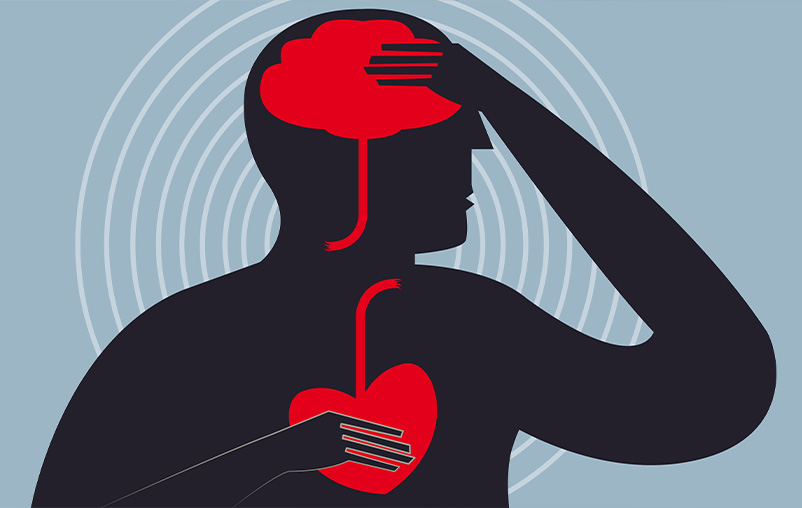High Blood Pressure & Heart Disease
Heart disease includes several conditions, but usually refers to coronary (heart) artery disease. When you have coronary artery disease, your heart’s blood vessels are clogged with fat.
A related condition is high blood pressure. Also known as hypertension, it happens when your blood pushes too hard against your veins and arteries.
Both heart disease and high blood pressure may shorten your life. Fortunately, you can take steps to protect your heart and your health.
Heart Disease Prevention
To prevent high blood pressure and heart disease, you can:
- Eat a healthy diet, including lots of fresh vegetables and fruits.
- Limit salt, sugar, saturated fats, trans fats (these raise cholesterol) and alcohol.
- Get regular physical activity and exercise.
- Aim for a healthy weight. Ask your doctor what a healthy weight is for you.
- Don’t smoke, vape or use tobacco. Learn about our smoking cessation program.
- Manage stress.
- Get enough sleep.
Risk Factors for High Blood Pressure
The National Heart, Lung & Blood Institute says risk factors for high blood pressure include:
- Age – Our blood vessels thicken and stiffen over time.
- Genetics – High blood pressure tends to run in families.
- Medications – Aspirin, ibuprofen and some prescription medications raise your blood pressure.
- Lifestyle habits – These include an unhealthy diet, tobacco use, alcohol use, lack of physical activity and lack of sleep.
- Race or ethnicity – High blood pressure is more common in Black and Hispanic adults than in white or Asian adults.
- Sex – Men are more likely than women to develop high blood pressure throughout middle age. But in adults aged 65 and older, women are more likely to have high blood pressure.
- Social and economic factors – Your income, education, type of job and any childhood trauma may contribute to your risk of high blood pressure.
Risk Factors for Heart Disease
Risk factors for heart disease include:
- High blood pressure – This is a major risk factor for heart disease.
- Age – The likelihood of heart disease rises as you get older.
- Diabetes – Diabetes happens when sugar builds up in the blood and the body doesn’t produce or respond properly to insulin. High blood sugar levels damage blood vessels and the nerves that control your heart.
- Family history – Genetic factors likely play a role in heart disease.
- Obesity – Too much body fat may lead to high blood pressure and heart disease.
- Lifestyle habits – These include an unhealthy diet, tobacco use, alcohol use, lack of physical activity and lack of sleep.
- Unhealthy cholesterol levels – If you eat more cholesterol (fat) than your body can use, the extra cholesterol builds up in your heart arteries.
Heart Disease in Bexar County
About 4% of Bexar County adults have angina (chest pain) or coronary artery disease.
Heart disease was the top cause of death in Bexar County in 2020, according to the San Antonio Metropolitan Health District.
University Health Resources
Primary Care
Primary care providers at University Health can help you prevent heart disease by:
- Screening for high blood pressure.
- Providing nutrition education.
- Recommending an exercise routine.
- Treating and managing other chronic conditions, like diabetes.
- Helping you quit smoking.
Heart & Vascular Care at University Health
If you have heart disease or high blood pressure, you can get excellent care and treatment from University Health’s cardiovascular team.
Healthy Texas Women
Low-income, uninsured women who are residents of Texas can get certain health services through the Healthy Texas Women program. One of the services is screening and treatment for high blood pressure. To enroll, please call 210-358-3350.
Community Resources
Viva Health!
Eat well and feel great when you attend wellness workshops and learn about nutrition resources from Viva Health. The program is available through the San Antonio Metropolitan Health District. Attend workshops to help you learn to eat better and live healthier and longer.
Home Blood Pressure Monitoring Guide & Passport
These Texas Health and Human Services resources help you learn more about blood pressure and how to track it at home.

Heart disease is the leading cause of death for both men and women.
Take our quick Heart Health Risk Assessment to understand your risk of heart disease and how to lower it




